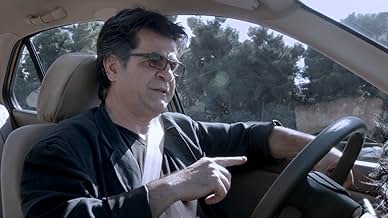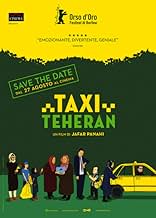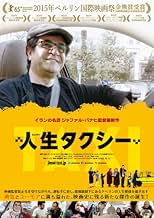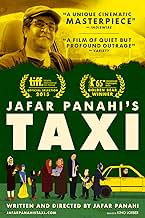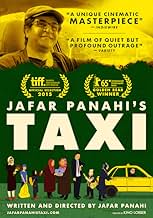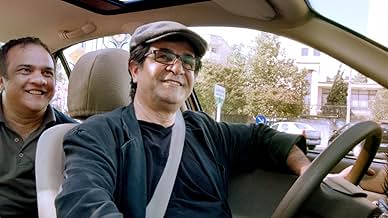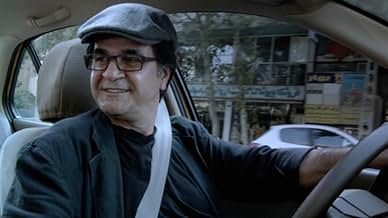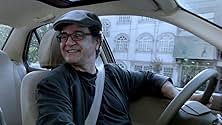Jafar Panahi wurde von der iranischen Regierung verboten, Filme zu drehen. Am Steuer eines Taxis dreht er einen Film über die sozialen Herausforderungen im Iran.Jafar Panahi wurde von der iranischen Regierung verboten, Filme zu drehen. Am Steuer eines Taxis dreht er einen Film über die sozialen Herausforderungen im Iran.Jafar Panahi wurde von der iranischen Regierung verboten, Filme zu drehen. Am Steuer eines Taxis dreht er einen Film über die sozialen Herausforderungen im Iran.
- Auszeichnungen
- 8 Gewinne & 8 Nominierungen insgesamt
Empfohlene Bewertungen
The premise of Taxi is simple - Panahi himself, with cameras cleverly affixed throughout his vehicle, drives a taxi through the teeming streets of Iran. Throughout the day, Panahi the cabbie picks up strangers, friends and relatives, played by themselves or non- professional actors. Along the way, he makes idle conversation with them, or they chat amongst themselves - ordinary chatter that carries quite extraordinary import.
It's fascinating, thought-provoking stuff, delving deeply into ideas and questions about Iran and its politics while firmly couched in the language of the everyday. Two passengers launch into an impassioned discussion on the merits (or lack thereof) of capital punishment and syariah law. The broken body of a man is bundled into the backseat and, with what he thinks is his dying breath, he tries to circumvent laws that will prevent his sobbing wife from inheriting their home. Art and ideas are sold on the streets, the stuff of covert piracy, as the precocious Hana Saeidi, Panahi's young niece, relates to him the lessons she has learnt on how exactly to make films that will be 'screenable' in Iran.
To be honest, the final film is an amiable if somewhat rickety affair. Parts of it work better as metaphors, faltering somewhat in the execution. For instance, Hana is, literally and metaphorically, the future - both of Iran and, with her own little hand-held camera, filmmaking. But the moment when she tries to exert control over a scene she's shooting from the window of the taxi, haranguing a little boy to behave differently so that her footage will pass muster in school, feels a little too on-the-nose. In a couple of instances, it's easy to identify the issues Panahi wants to raise: in a bowl of fish or an iPad video, he finds insights about the power of superstition and the tragedy of poverty. But the scenes themselves don't always work as well, ambling when they should sprint.
Nevertheless, it's impossible to remain unmoved by the quiet power and heartbreaking passion of Taxi. This is a gem of a film: subtle, leisurely and surprisingly funny; thoughtful and deep but rarely overbearingly so. It's all the more impressive, of course, as a testament to Panahi's ongoing refusal to bend and break beneath the 20-year filmmaking ban that was slapped on him in December 2010. Since then, he's smuggled a film out of Iran on a flash drive baked into a cake, and assembled Taxi out of cam footage shot in broad daylight in Tehran. That's why, in ways both big and small, Taxi serves as a bold reminder of the bravery and strength of the human spirit.
Panahi assumes the guise of a taxi driver (apparently a nod to fellow Iranian director Abbas Kiarostami's film, "Ten") and drives around a city, much like any other city, picking up various passengers throughout the day. There are moments of hilarity as Pahani deals with one situation after another, but underneath it all is a telling story of what life is like in Iran today, with particular attention to issues of censorship, state sanctioned brutality, women's rights, and of course, how this affects the arts and culture. It makes light of life in Iran and pokes fun at the powers that be, all the while recognizing that their actions have serious ramifications.
It is for the most part an engaging film, but given that it all takes place in a taxi and as such, is almost completely driven by dialog, it can drag a little. Still, for what it is, a piece of political theater, it is really excellent. If you get a chance to see it, I'd recommend it if for no other reason than to get a small feel for a country we, in the Western world, get to see so little of.
This movie entirely set in a taxi, well, the cameras never leaves the car, but car roams around the city, Tehran. A real time movie that runs for nearly 80 minutes. There's no open or the end credits other than the title texts and some statements. The story was very interesting, that I don't know whether it was scripted or factual, but the planning was so good to shoot it in a low profile.
All the actors except the director were non pros. That definitely needs a loud applaud, because the outcome tells the quality of their exhibition. It gives a glimpse of the life as a taxi driver who sees the city through his eyes and meets the people. Some scenes were extremely funny, some were dark humours and some were thoughtful. Each time when a new character enters the frame, a new topic has brought with them and discussed, that mean the movie is totally engaging with a variety that keeps you hooked till the final.
"We already have the world record of hangings after China."
I think the end was very smart, because of that kind of conclusion and no post-production credits, I thought that's how the archives were smuggled out of the country and made it ready. But no one knows the truth how it all has been done, otherwise Jafar Panahi would have landed in a trouble. A rare gem and one of the best of 2015 that you must try it if you are a film fanatic.
Initially, I mean before decide to watch it, I was not sure it will reach my expectations. When I sat for it, the experience was different and now I am extremely happy for giving it a try. Opinion might vary about the film, but the effort must be appreciated. Especially in a circumstance where the filmmaker has everything against him, I meant legally, but came strong in what he believes is his passion. That is inspiring and also for a risk he has taken really paid off.
It won a few Internation Filmfare awards and that's how I actually came to know about this. I'm positive this film won't disappoint you as well, well, if you are not looking for twists and turns like an intelligent or a big budget film. As I said, I could have not asked a better than this, a very simple yet entertaining movie.
8/10
In Tehran Taxi, Panahi masquerades as a taxi driver and picks up a range of curious passengers throughout Tehran; from a couple of old ladies nursing a goldfish in a bowl, a mugger, a flower seller and a traffic accident victim.
It's an unusual style, but one made familiar by dash-cams across the world and both the subject matter and style of interlocking stories reminded me of Jim Jarmush's 1991 film 'Night on Earth'.
Panahi isn't a comedian, but his style is lighthearted. The fact he is a film maker rather than a real taxi driver also means that he doesn't know many directions around the city and he further bemuses passengers when he refuses to take payment at the end of the ride. Equally though film paints an interesting picture of the everyday lives of the passengers and the buzz of the city going on on the streets of Tehran outside of the taxi's window.
Tehran Taxi is an excellent film. Sit back and enjoy the ride!
Wusstest du schon
- WissenswertesShortly after the film's premiere at Berlin was announced, Jafar Panahi released an official statement in which he promised to continue making films despite the ban and said, "Nothing can prevent me from making films since when being pushed to the ultimate corners I connect with my inner-self and, in such private spaces, despite all limitations, the necessity to create becomes even more of an urge."
- Zitate
Nasrin Sotoudeh: They work in a way that let us to know they are watching us.Their tactics are obvious.First, they write you up a police record. Suddenly, you are accused of being an agent for Mossad, The CIA, or MI6. Then they tack on something about your morals, your lifestyle. They make your life into a prison.Although you are released from prison, but the outside world is only a bigger prison.They make your nearest friends into your worst enemies.After that you think all you can do is either leave the country or pray to return to that hole. So i think it's better to let it go.
- VerbindungenReferenced in Film Junk Podcast: Episode 547: The Revenant and Best of 2015 (2016)
Top-Auswahl
- How long is Taxi?Powered by Alexa
Details
Box Office
- Bruttoertrag in den USA und Kanada
- 321.642 $
- Eröffnungswochenende in den USA und in Kanada
- 22.531 $
- 4. Okt. 2015
- Weltweiter Bruttoertrag
- 3.906.227 $
- Laufzeit1 Stunde 22 Minuten
- Farbe
- Sound-Mix
Zu dieser Seite beitragen



